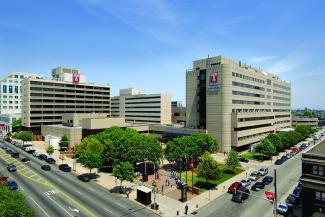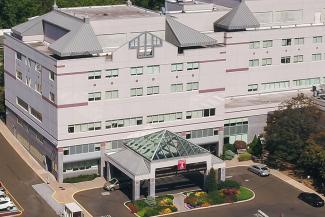Temple’s interventional cardiologists use minimally invasive catheter-based (percutaneous) procedures to diagnose and treat cardiovascular disease. We specialize in advanced diagnostics and treating high-risk patients who could not be helped at other institutions. Using state-of-the-art hemodynamic assessments, diagnostic technology, and endovascular and vascular interventional techniques, the interventional cardiology team diagnoses and treats both basic and complex conditions and offers cutting edge therapies.
Minimally Invasive Procedures to Treat Heart Disease
A catheter is a thin, flexible tube that is inserted into a large blood vessel in the leg/groin, arm, wrist, or neck. The interventional cardiologist uses X-ray or ultrasound imaging to safely guide the catheter through the blood vessels to the heart. This method allows for precise diagnostic procedures—for instance, ultrasound inside the heart for direct measurement of blood flow through the heart. It also enables treatments like stenting to reopen obstructed blood vessels, or replacement of a damaged aortic heart valve in a patient who is ineligible for traditional surgery. A cardiac catheterization, or intervention, usually results in less pain, less bleeding, and a shorter recovery time than open surgical procedures.
Temple’s interventional cardiology program is a regional leader in using patient-preferred techniques like transradial artery access, in which the catheter is inserted through the wrist (radial) artery.
Specialized Team with Sophisticated Resources
Temple’s catheterization laboratory is one of the largest in the region, with five state-of-the-art catheterization suites and nine full-time technicians. The interventional cardiology team also uses specialized facilities to perform hybrid procedures—combining open surgery and catheterization to minimize complications and shorten recovery time. Our highly experienced interventional cardiologists, technicians, and support staff guide over 3,000 patients each year, including many high-risk patients, through diagnosis and treatment. The diagnostic and treatment team includes:
- Interventional cardiologists
- General cardiologists
- Radiologists
- Electrophysiologists
- Vascular specialists
- Heart failure cardiologists
Learn More About Interventional Cardiology
Daniel Edmundowicz, MD, Chief, Temple Cardiology discusses a program at Temple that offers kidney sparing cardiac techniques for patients with kidney disease who require a cardiac intervention.


